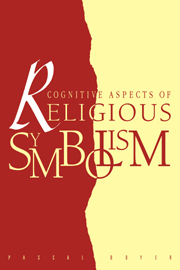Book contents
- Frontmatter
- Contents
- List of contributors
- I Cognitive processes and cultural representations
- II The structure of religious categories
- 3 Computational complexity in the cognitive modelling of cosmological ideas
- 4 ‘Earth’ and ‘path’ as complex categories: semantics and symbolism in Kwaio culture
- 5 Domain-specificity, living kinds and symbolism
- 6 Pseudo-natural kinds
- III Acquisition and belief fixation
- IV The structure of ritual action
- References
- Index of names
- Subject Index
5 - Domain-specificity, living kinds and symbolism
Published online by Cambridge University Press: 05 November 2011
- Frontmatter
- Contents
- List of contributors
- I Cognitive processes and cultural representations
- II The structure of religious categories
- 3 Computational complexity in the cognitive modelling of cosmological ideas
- 4 ‘Earth’ and ‘path’ as complex categories: semantics and symbolism in Kwaio culture
- 5 Domain-specificity, living kinds and symbolism
- 6 Pseudo-natural kinds
- III Acquisition and belief fixation
- IV The structure of ritual action
- References
- Index of names
- Subject Index
Summary
This chapter is highly speculative. It explores the possibility that some recent work in developmental cognitive psychology might help us to understand aspects of what has often been called ritual symbolism. In particular, it is concerned with the old question of the prominence in many religious practices of living kinds, both as objects and concepts.
In a number of recent articles S. Atran (1987a) and D. Sperber (1985a) have been making increasingly strong claims for the existence of a specific cognitive domain concerning ‘living kinds’. In this they have been following recent suggestions made by Fodor (1983) which make the case for the existence of numerous such distinct cognitive domains. They have accompanied their claim for the existence of a specific cognitive domain for living kinds with suggestions concerning the significance the existence of such a domain might have for anthropology. For the purpose of this short chapter only, I shall assume that Atran and Sperber are right without further discussion, none the less, and in some ways, I shall want to go further than they do. I shall also be using their hypothesis to illuminate an area of concern which is not theirs.
Atran (1990, and this volume) argues that in all cultures cognition about living kinds is governed by different rules than cognition about other kinds and that in all cultures the rules governing the cognition of living kinds are the same. Such an observation leads to the suggestion that there is an innate predisposition among all humans for constituting a ‘living-kinds domain’.
- Type
- Chapter
- Information
- Cognitive Aspects of Religious Symbolism , pp. 111 - 120Publisher: Cambridge University PressPrint publication year: 1993
- 6
- Cited by



